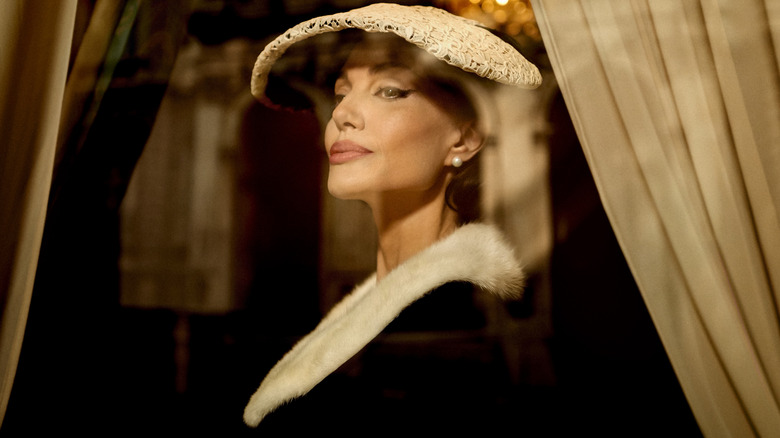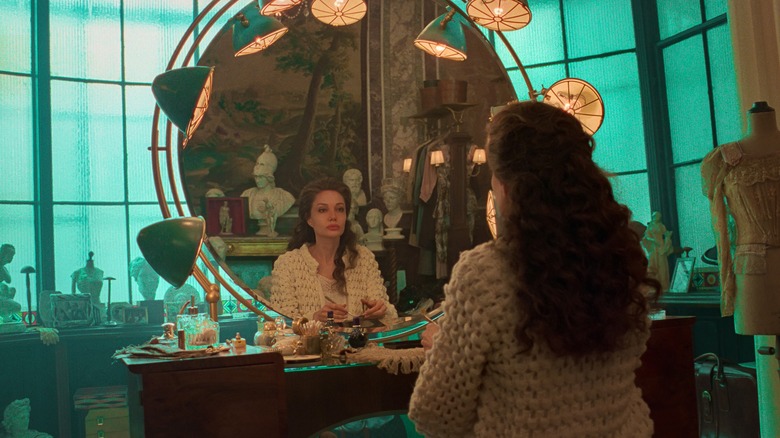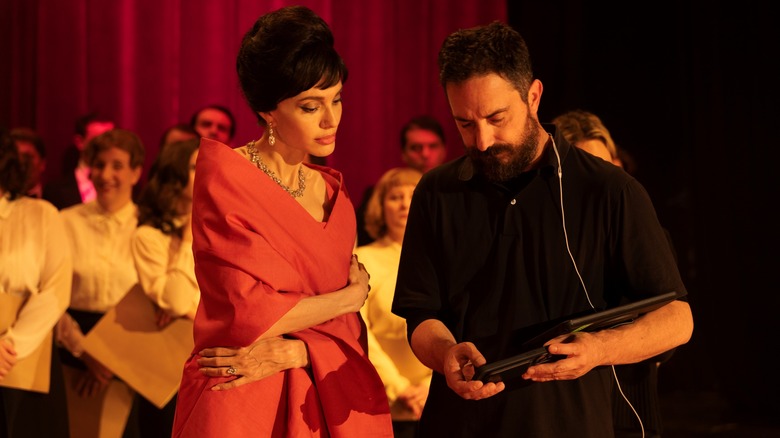A wierd factor occurs when lifelong artists start to sense the sunshine on the finish of the tunnel. Some, like Francis Ford Coppola with “Megalopolis,” have the liberty to exit on their very own phrases, weapons blazing and critics be damned, with one of the bombastic and lavish works they’ve ever produced. Others, nevertheless, aren’t almost as lucky. Time and trauma take their tolls, forcing even the best legends to cope with a way more sophisticated actuality: the truth that their desires not match actuality. By the top, nostalgia crashes laborious in opposition to resentment and triggers a deep-rooted ache directed in direction of the very skills that made life price residing within the first place.
Spanish filmmaker Pablo Larraín is not even near the end line, after all, but in some ways “Maria” appears like his most wistful and self-reflexive film but. After guiding each “Jackie” and “Spencer” to such excessive acclaim lately, his newest brings a stirring near his fascination with well-known girls at significantly harrowing moments of their public (and personal) lives. Much more tragic than both of his earlier topics, nevertheless, the story this time round facilities on world-renowned opera singer Maria Callas over the last week of her life in 1977 Paris. The historical past books, tabloid hit items, and information stories of the time bear in mind her last years as that of a shut-in, a cautionary story of what occurs when scandal and self-destructive vices rob the world of a one-of-a-kind celeb far too quickly. What Larraín and the perfectly-cast Angelina Jolie reimagine as a substitute is an completely human rendering of a larger-than-life determine, which required a transcendent efficiency by one other really larger-than-life film star to do her any justice in any way.
It would be far too reductive to attract any direct 1:1 parallels between Maria and Larraín (and even Jolie), as tempting because it may be, nevertheless it’s obvious that this film might’ve solely been made by these particular artists at this very particular second of their careers. “Maria” stands out as a becoming swan tune (of types) by placing a bow on this religious “trilogy” of biopics – one which’s each inch as soulful, heartbreaking, and superbly contradictory as the girl herself.
Maria is Pablo Larraín at his most haunted and fatalistic … and his funniest
“The world took liberties with me,” Maria Callas morosely observes early on, whilst she’s surrounded by the decadence that very same world as soon as so freely lavished upon her. “Maria” does not shrink back from even essentially the most mundane contradictions and ironies behind the ill-fated opera singer, although that by no means as soon as undermines the real burdens she bears. In actual fact, the empathetic script (from “Jackie” screenwriter Steven Knight) begins with its most fatalistic scene of all earlier than flashing again to every week earlier, charting Maria’s last days as she makes an attempt one final comeback to reclaim her voice (in each sense of that phrase) and show she’s not the washed up “prima donna” everybody sees her as. Whether or not she’s doing this for her self-importance, her legacy, or one thing else totally is pointedly left unsaid … although not unexplored.
Very similar to the haunted tone prevalent in each “Jackie” and “Spencer,” “Maria” takes the type of a ghost story within the early going. It isn’t simply that the enhancing (dealt with by Sofía Subercaseaux) provides to the movie’s early unease by continuously peppering in black-and-white footage of Jolie’s Maria in her prime alongside stylized movie reels of her non-public life, abruptly slicing away from the current to lavish in her previous triumphs on the opera stage. Cinematographer Edward Lachman’s digicam roves by way of empty hallways and gorgeously set-dressed rooms like a silent, unseen observer soaking in Maria’s fallen state. This rigorously established visible language is just damaged on the few events Maria ventures outdoors her Parisian mansion, when she conducts tv interviews with a scrawny reporter (Kodi Smit-McPhee, who greater than holds his personal) that delve proper into the turbulent psychology of the legendary singer. Then once more, these are the identical sequence of conversations that Maria herself, affected by an dependancy to Mandrax capsules, readily admits won’t be precisely what they appear.
Impressively, the movie’s blurring between truth, fiction, and fantasy with these “visions” makes room for astonishing quantities of humor. Larraín has hardly ever been funnier or extra sarcastic than he’s right here, packing in visible punchlines, snappy operating gags, and witty barbs of dialogue — most of that are delivered by Maria’s solely two companions, her lengthy struggling butler Ferruccio (Pierfrancesco Favino) and her family maid Bruna (Alba Rohrwacher). Collectively, they floor Maria’s epic emotional journey in one thing actual, quietly giving Maria permission to wrestle together with her id as Maria, not the suffocating La Divina (The Divine One) moniker that the general public topped her as.
Angelina Jolie provides a efficiency for the ages
Virtually each immaculate shot in “Maria” is framed as if it had been the title character’s personal theater stage. This makes an apt runway for Angelina Jolie to do her factor and ship simply her most dialed-in efficiency of the final decade (or extra). Jolie’s bravura singing skills have undoubtedly stolen all of the headlines all through this pageant run, however do not sleep on Larraín’s course, Knight’s script, and Larraín’s images working in excellent tandem with Jolie’s extra general bodily efficiency. The digicam repeatedly holds on Jolie’s deceptively fragile-looking face to trace on the effectively of feelings that she usually refuses to let others see. Confident and blisteringly assured on the surface as solely a profitable singer may very well be, it is within the temporary moments that Maria drops her guard that the infinite depths of her interiority come flooding in. Awards prognosticating will at all times be essentially the most boring technique to strategy motion pictures like these, however relaxation assured that Jolie will obtain her flowers no matter whether or not the Academy takes discover or not.
The identical may be mentioned for the general film. At any time when “Maria” covers floor trodden by numerous biopics earlier than, like her troubled childhood or her ominous well being points or her supremely sophisticated love life with each husband Giovanni Battista Meneghini (Alessandro Bressanello) and eventual lover Aristotle Onassis (Haluk Bilginer), at the least Larraín does so with a lightweight contact and a mind for surprising element. Within the course of, the filmmaker strikes on the coronary heart of what the story of Maria Callas was at all times about. By skipping previous the extra conventionally dramatic years of her life, “Maria” frees itself to discover potent themes of energy and management and company. Alongside the way in which, these extra aware of Maria’s backstory — trace: take one other have a look at her lover Aristotle’s very well-known surname — will respect how the director all however reaches by way of the display and overtly touch upon the lengthy shadow forged by “Jackie.” This has the additional benefit of injecting a wry sense of self-deprecation to the proceedings … together with the sensation that he is genuinely prepared to flee this biopic-shaped field he is constructed for himself (which was plain to see for individuals who bothered to observe his final movie, “El Conde”).
By the point we attain the ultimate curtain name, the ending is not a lot predictable as it’s tragically inevitable. “Maria” won’t fairly attain the identical heights as its two biopic predecessors, however take into account that that was by no means the intention within the first place. If there’s something that actually holds this again, it is the Netflix distribution deal that condemns this to an ill-deserved streaming destiny. Neglect about being a theater snob or purist — when Jolie’s Maria is belting out sonnets and basking within the deafening applause of her adorers, the impact can not help however be dampened when seen on one’s laptop computer or in a single’s front room quite than with a packed crowd.
Nonetheless, that is hardly the movie’s fault. “Maria” closes out this trilogy precisely because it began and, for one final time, we’re given a window into one of the unknowable people of many years previous. Movie gods keen, Larraín’s subsequent part will really feel simply as important and thrilling as this one.
/Movie Score: 8 out of 10
“Maria” will launch in choose theaters November 27, 2024, adopted by its streaming premiere on Netflix December 11, 2024.

![Angelina Jolie Delivers A Transcendent Efficiency [NYFF] Angelina Jolie Delivers A Transcendent Efficiency [NYFF]](https://i2.wp.com/www.slashfilm.com/img/gallery/maria-review-angelina-jolie-delivers-a-transcendent-performance-nyff/l-intro-1727469064.jpg?w=696&resize=696,0&ssl=1)


